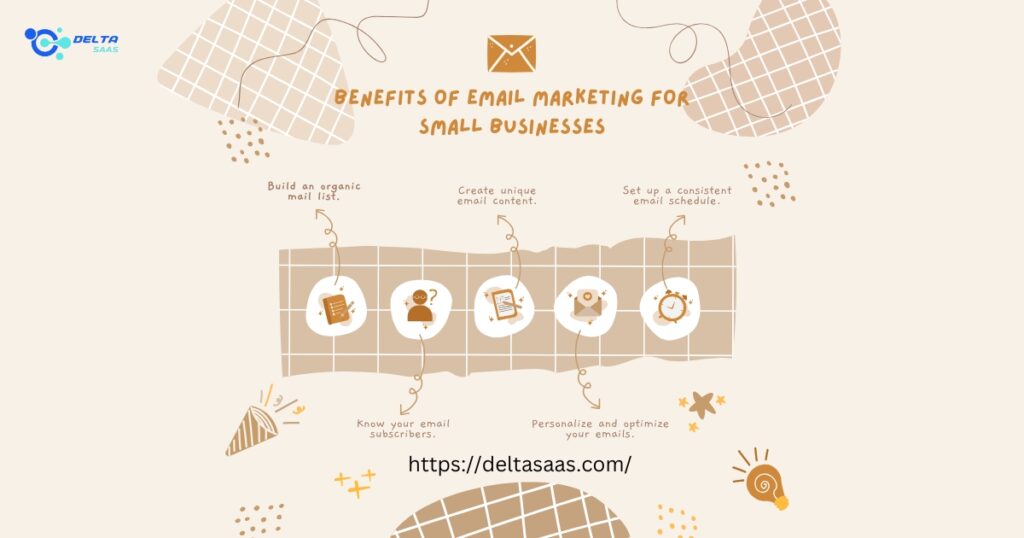Benefits of Email Marketing for Small Businesses
Email marketing is a powerful digital strategy that helps small businesses connect with their target audience, boost sales, and increase brand awareness. It is cost-effective, data-driven, and provides a high return on investment (ROI). Businesses use email marketing strategies to send promotional emails, nurture leads and personalize customer communication.
What is Email Marketing?
Email marketing is a form of online marketing that involves sending emails to a targeted audience. It includes promotional emails, newsletters, transactional emails, and engagement campaigns. Businesses use email marketing SaaS tools and software to automate the marketing process, track customer behavior, and analyze performance metrics.
Why Email Marketing is Essential for Small Businesses
Small businesses often have limited budgets, making advertising competition with large brands challenging. Email marketing is a cost-effective solution that helps businesses generate leads, increase brand awareness, and drive website traffic without spending a fortune. It allows businesses to own their contact lists and communicate directly with customers.
Top Benefits of Email Marketing
Cost-Effective Marketing Strategy
Email marketing is one of the most affordable digital marketing strategies. Unlike social media advertising or pay-per-click (PPC) campaigns, sending emails does not require a high budget. Businesses can use free or low-cost mail marketing tools to create and send campaigns without spending on expensive ads.
High ROI and Profitability
Email marketing provides one of the highest returns on investment in digital marketing. According to Smart Insights, the average ROI of email marketing is $42 for every $1 spent. This makes it an attractive option for small businesses looking to boost sales and revenue.
Personalization and Customization
Unlike traditional advertising, email marketing allows businesses to personalize messages for their audience. Businesses can segment their contact lists based on customer preferences, purchase history, and behavior. Personalized emails improve customer engagement and increase conversion rates.
Helps Build Relationships and Credibility
Email marketing helps businesses establish trust and credibility with their audience. By sending valuable content, updates, and promotional offers, businesses can nurture customer relationships and keep them engaged. A well-crafted email marketing strategy ensures customers stay informed about new products, services, and industry trends.
Increases Website Traffic and Lead Generation
Sending emails with relevant content and call-to-action (CTA) buttons helps businesses generate website traffic. Small businesses can use email marketing to drive potential customers to their websites, increasing the chances of conversion. Email marketing is also an effective B2B lead generation strategy.
Measurable and Data-Driven
One of the key advantages of email marketing is its ability to track and measure results. Businesses can analyze email marketing analytics, including open rates, click-through rates, bounce rates, and conversion rates. Marketing software provides insights into customer behavior, helping businesses optimize their marketing tactics.
Marketing Automation for Efficiency
Marketing automation tools allow businesses to schedule and send automated emails based on customer actions. Automated workflows ensure timely follow-ups, abandoned cart reminders, and personalized offers, improving customer retention and sales.
Enhances Content Marketing Strategies
Email marketing supports content marketing by delivering valuable content directly to the audience’s inbox. Businesses can share blog posts, infographics, case studies, and promotional content to keep customers engaged. This enhances brand awareness and strengthens customer relationships.
Helps Reach the Right Audience
Email marketing strategies focus on targeted communication. Unlike social media, where posts reach a broad audience, emails are sent to specific individuals who have shown interest in a business. This ensures marketing messages reach the right audience and improve engagement rates.
Read More: Grow Digital Business with Smart Strategies
Saves Time and Money
Email marketing is a time-efficient solution compared to traditional advertising. Businesses can use email templates and automation to streamline their marketing process. It reduces costs associated with printing, postage, and paid advertisements while delivering maximum results.
Types of Email Marketing and Their Impact on Business
Email marketing consists of various campaign types designed to meet different business goals. Understanding these strategies helps small businesses improve engagement, generate leads, and boost sales.
Popular Types of Email Marketing
Promotional Emails
Promotional emails promote products, services, discounts, and special offers. Businesses send these emails to encourage customers to make purchases, increasing revenue. These emails often include limited-time offers, seasonal sales, and discount codes.
Welcome Emails
A welcome email is the first message a business sends when someone subscribes to their mailing list. These emails help create a positive first impression, introduce the brand, and guide new subscribers on what to expect.
Newsletter Emails
Newsletters inform subscribers about business updates, industry news, and valuable content. They help businesses stay connected with their audience and drive website traffic. Many businesses use newsletters to share blog posts, upcoming events, or success stories.
Transactional Emails
Transactional emails include order confirmations, receipts, and shipping notifications. These emails provide essential information to customers and improve the overall shopping experience.
Re-Engagement Emails
Re-engagement emails target inactive subscribers or previous customers who haven’t interacted with a business. These emails encourage customers to return by offering incentives or reminding them of past interactions.
Abandoned Cart Emails
Abandoned cart emails are sent to customers who leave items in their online shopping carts without completing a purchase. These emails remind customers to return and complete their orders, increasing conversion rates.
Read More: Online Advertising Strategies: A Comprehensive Guide
Survey and Feedback Emails
Survey emails help businesses gather customer feedback about their products or services. Understanding customer opinions allows businesses to improve their offerings and strengthen customer relationships.
Event Invitation Emails
Businesses use event emails to invite subscribers to webinars, product launches, or networking events. These emails help increase participation and engagement.
Email Marketing vs. Other Digital Strategies
Email marketing remains one of the most effective digital strategies, but how does it compare to other forms of marketing?
| Marketing Channel | Cost | Targeting | ROI | Engagement | Measurability |
| Email Marketing | Low | High | High | High | Easy to track |
| Social Media Ads | Medium | Medium | Medium | High | Medium |
| SEO (Organic Search) | Low | High | High | Medium | Difficult |
| PPC Advertising | High | High | Medium | High | Easy to track |
| Traditional Advertising | High | Low | Low | Low | Hard to measure |
How Small Businesses Can Improve Their Email Marketing Strategy
For email marketing to be successful, businesses need a solid marketing plan. Here are some essential marketing tips to improve email campaigns.
Build and Own a Quality Email List
Having a high-quality email list is crucial for success. Businesses should focus on growing their contact list organically by offering incentives, such as free e-books, discounts, or exclusive content.
Use Personalization for Higher Engagement
Personalization helps businesses create tailored emails that resonate with their audience. Using a customer’s name, past purchases, or browsing behavior improves engagement and conversion rates.
Optimize Subject Lines for Higher Open Rates
The subject line determines whether an email gets opened or ignored. Businesses should craft short, compelling subject lines encouraging subscribers to read the email.
Implement Marketing Automation
Marketing automation tools help businesses send timely and relevant emails without manual effort. Automated email sequences, such as welcome series and follow-ups, improve efficiency and customer engagement.
Read More: Digital Marketing Tips for Small Business Success
Use Email Templates for Consistency
Pre-designed email templates save time and ensure a professional appearance. To maintain brand identity, businesses should use consistent branding, including logos, colors, and fonts.
Analyze Email Marketing Analytics
Tracking key metrics, such as open rates, click-through rates, and conversions, helps businesses understand what works and needs improvement. Data-driven decisions improve campaign effectiveness.
Optimize Emails for Mobile Devices
Since most emails are opened on mobile devices, businesses should ensure they are mobile-friendly. A responsive design, clear formatting, and concise content improve the user experience.
Emerging Trends and the Future of Email Marketing
Email marketing continues to adapt to new trends and emerging technologies as technology evolves. Businesses that stay ahead of these trends can enhance their marketing tactics and achieve better results.
Key Email Marketing Trends
Artificial Intelligence (AI) and Predictive Analytics
AI-powered marketing tools help businesses analyze customer behavior, segment audiences, and personalize email campaigns. Predictive analytics allows businesses to anticipate customer needs and send relevant offers quickly
Interactive Emails
Interactive emails improve engagement by allowing users to interact within the email itself. Features such as clickable carousels, surveys, and product showcases enhance the user experience and increase conversions.
Hyper-Personalization
Basic personalization is no longer enough, like using the recipient’s name. Hyper-personalization leverages AI and data-driven insights to tailor content based on customer preferences, purchase history, and browsing behavior.
Automated and Triggered Emails
Automated email sequences help businesses send timely messages based on user actions. Examples include welcome emails, abandoned cart reminders, and follow-up emails after purchases.
Dark Mode Optimization
With more users enabling dark mode on their devices, businesses must optimize emails to display correctly. Ensuring readability and proper formatting in dark mode improves email performance.
Data Privacy and Compliance
As data privacy regulations tighten, businesses must ensure compliance with laws such as GDPR and CCPA. Providing clear opt-in options and allowing users to control their preferences builds trust and credibility.
Integration with Other Marketing Platforms
Email marketing works best when integrated with other digital marketing strategies. Combining email marketing with social media, content marketing, and PPC campaigns creates a seamless customer journey.
Learn More,
Why is effective online communication important?
Boosting Email Engagement: Proven Strategies for Success
Email A/B Testing Mistakes to Avoid
Email Deliverability Issues: Causes & Fixes
How to Improve Conversion Rate in Email Campaigns
Advantages and Disadvantages of Email Marketing
While email marketing offers numerous benefits, it also has some challenges. Understanding both helps businesses create more effective strategies.
Advantages:
- Cost-Effective: Low-cost marketing strategy compared to paid advertising.
- High ROI: Generates significant returns with minimal investment.
- Personalization: Tailors messages based on customer preferences.
- Measurable Results: Provides insights into performance metrics.
- Automation: Saves time with scheduled and triggered emails.
Disadvantages:
- Spam Filters: Emails may get marked as spam if not properly optimized.
- Competition: High email volume makes it challenging to stand out.
- List Maintenance: Requires regular updates to remove inactive subscribers.
- Deliverability Issues: Poor email practices can lead to low inbox placement.
Final Thoughts on Email Marketing
Email marketing remains vital for small businesses looking to generate leads, build relationships, and boost sales. By leveBusinesseseate effective campaigns that engage their target audience. As te by leveraging marketing software, personalization, and automationchnology advances, adapting to new trends will ensure that email marketing remains a valuable asset in any marketing strategy.
FAQs on Email Marketing
What is email marketing, and why is it important?
Email marketing is a digital marketing strategy that sends targeted emails to customers. It is important because it helps businesses build relationships, drive sales, and generate website traffic.
What are the 10 benefits of email marketing?
- Cost-effective
- High ROI
- Personalization
- Increased website traffic
- Better customer engagement
- Automation capabilities
- Measurable results
- Boosts sales
- Supports content marketing
- Enhances brand awareness
How does email marketing help small businesses?
Email marketing helps small businesses by providing a cost-effective way to reach customers, nurture leads, promote products or services, and build long-term customer relationships.
What are the disadvantages of email marketing?
Some disadvantages include spam filters, high competition, list maintenance, and deliverability issues. However, using best practices can reduce these challenges.
What is the difference between promotional and transactional emails?
Promotional emails are used for marketing campaigns and special offers, while transactional emails include order confirmations, receipts, and account updates.
How can I improve my email open rates?
To improve open rates, use personalized subject lines, send emails at the right time, segment audiences, and avoid spammy content.
What are the best email marketing tools for small businesses?
Popular email marketing tools include Mailchimp, HubSpot, Constant Contact, and Sendinblue. These tools offer automation, analytics, and customization options.
How does email marketing compare to social media marketing?
Email marketing offers direct communication, higher conversion rates, and better ROI, while social media marketing focuses on brand awareness and engagement.
What is an email marketing strategy?
An email marketing strategy is a plan that outlines how businesses use email campaigns to reach their audience, promote products, and achieve marketing goals.
How do I measure the success of my email marketing campaigns?
Success is measured using email marketing analytics, including open rates, click-through rates, bounce rates, and conversions.


